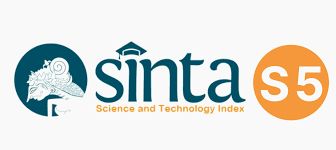Opportunities and Challenges of Embedding AI in SINTA: A Systematic Literature Review
DOI:
https://doi.org/10.25170/metris.v25i02.6204Keywords:
Artificial Intelligence (AI), SINTA Integration, Research Management, Opportunities, ChallengesAbstract
The incorporation of Artificial Intelligence (AI) into Indonesia's Science and Technology Index (SINTA) offers both significant opportunities and challenges for advancing research management, evaluation, and development. This paper examines the advantages of embedding AI into SINTA, such as the ability to automate the identification of predatory journals, provide personalized research recommendations, and enhance the accuracy of institutional rankings. Furthermore, AI can help analyze citation trends, streamline the peer review process, and detect plagiarism or other forms of academic misconduct. However, this integration also brings several obstacles, including the need to ensure high-quality data, uphold transparency and fairness in AI-driven outcomes, protect data privacy, and address the substantial technological investments required. While AI holds the potential to greatly strengthen SINTA as a platform for overseeing and supporting research activities in Indonesia, overcoming these challenges is critical for its effective implementation. The study concludes that, with proper oversight and investment, integrating AI into SINTA could significantly boost the country's research ecosystem, fostering greater innovation and scientific productivity.
References
Abedjan, Z. (2022). Enabling data-centric AI through data quality management and data literacy. it-Information Technology, 64(1-2), 67-70.
Bertossi, L., & Geerts, F. (2020). Data quality and explainable AI. Journal of Data and Information Quality (JDIQ), 12(2), 1-9.
Carobene, A., Padoan, A., Cabitza, F., Banfi, G., & Plebani, M. (2024). Rising adoption of artificial intelligence in scientific publishing: evaluating the role, risks, and ethical implications in paper drafting and review process. Clinical Chemistry and Laboratory Medicine (CCLM), 62(5), 835-843.
Chen, L., Chen, P., & Lin, Z. (2020). Artificial intelligence in education: A review. IEEE Access, 8, 75264-75278.
Chubb, J., Cowling, P., & Reed, D. (2022). Speeding up to keep up: exploring the use of AI in the research process. AI & society, 37(4), 1439-1457.
da Silva, J. A. T., & Scelles, N. (2024). An artificial intelligence tool misclassifies sport science journals as predatory. Journal of Science and Medicine in Sport, 27(4), 266-269.
Devineni, S. K. (2024). AI in Data Privacy and Security. International Journal Of Artificial Intelligence & Machine Learning, 3(01), 35-49.
Fitria, T. N. (2023). Utilization of SINTA (Science and Technology Index) as web-based research information system. International Journal of Computer and Information System (IJCIS), 4(2), 50-62.
Kumar, R., Eaton, S. E., Mindzak, M., & Morrison, R. (2024). Academic integrity and artificial intelligence: An overview. Second Handbook of Academic Integrity, 1583-1596.
Lathabai, H. H., Nandy, A., & Singh, V. K. (2022). Institutional collaboration recommendation: An expertise-based framework using NLP and network analysis. Expert Systems with Applications, 209, 118-154.
Maghsudi, S., Lan, A., Xu, J., & van Der Schaar, M. (2021). Personalized education in the artificial intelligence era: what to expect next. IEEE Signal Processing Magazine, 38(3), 37-50.
Maier, M., Carlotto, H., Saperstein, S., Sanchez, F., Balogun, S., & Merritt, S. (2020). Improving the accuracy and transparency of underwriting with AI to transform the life insurance industry. AI Magazine, 41(3), 78-93.
Rajpal, R. D. (2024). AI’s Impact on Academic Excellence and Integrity. Scholar’s Digest: Journal of Educational Research & Training,1(1), 48-56.
Rock, D. (2019). Engineering value: The returns to technological talent and investments in artificial intelligence. Social Science Research Network, 1-76.
Saarela, M., & Kärkkäinen, T. (2020). Can we automate expert-based journal rankings? Analysis of the Finnish publication indicator. Journal of informetrics, 14(2), 101-108.
Taheri, S., & Aliakbary, S. (2022). Research trend prediction in computer science publications: a deep neural network approach. Scientometrics, 127(2), 849-869.
Tang, K.-Y., Chang, C.-Y., & Hwang, G.-J. (2023). Trends in artificial intelligencesupported e-learning: A systematic review and co-citation network analysis (1998–2019). Interactive Learning Environments, 31(4), 2134-2152.
Teixeira da Silva, J. A., & Daly, T. (2023). The diagnostic accuracy of AI-based predatory journal detectors: an analogy to diagnosis. Diagnosis, 10(4), 446-447.
Teixeira da Silva, J. A., Tsigaris, P., & Moussa, S. (2023). Can AI detect predatory journals? The case of FT50 journals. The Case of FT50 Journals (March 16, 2023).
Venkatesan, V. K., Ramakrishna, M. T., Batyuk, A., Barna, A., & Havrysh, B. (2023). High-Performance Artificial Intelligence Recommendation of Quality Research Papers Using Effective Collaborative Approach. Systems, 11(2), 1-14.












